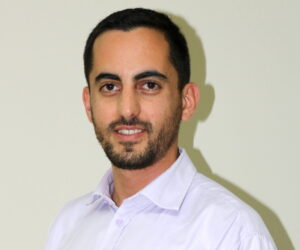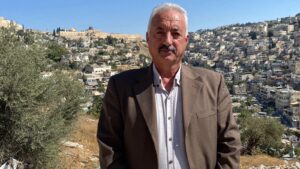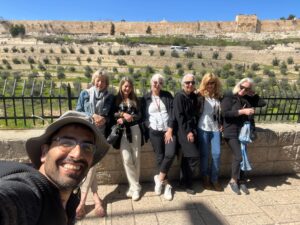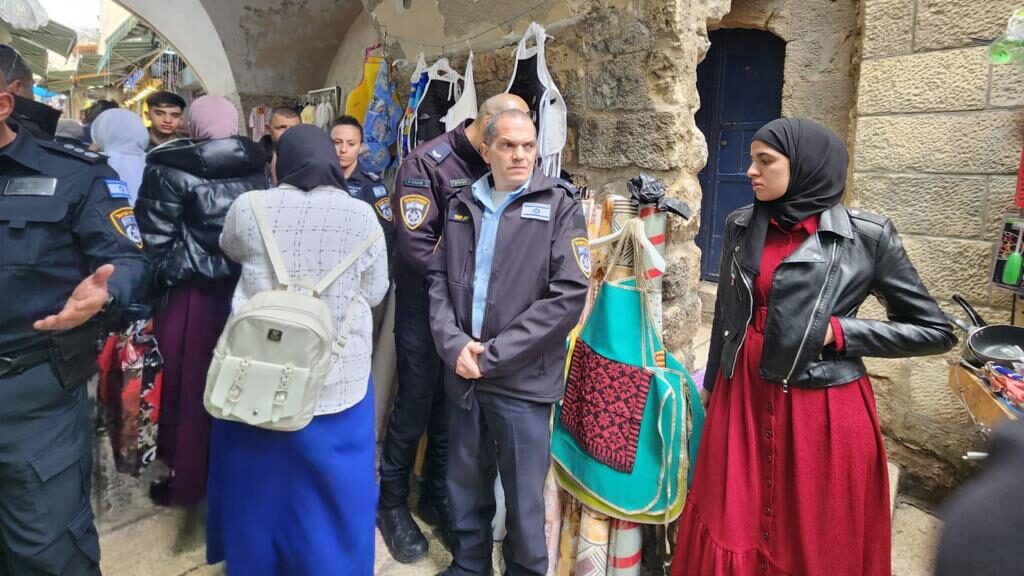Jerusalem Prays for Quiet During Muslim, Jewish Holidays
Ramadan has become a holy month associated with violence, and there is concern that Jerusalem could again be a flashpoint
Fakhri Abu Diab was born and raised in Silwan, a large Palestinian neighborhood in east Jerusalem. After raising five children and 12 grandchildren, he is losing hope that he will live in peace in the city. With the Muslim holy month of Ramadan coming up, Diab – who is an activist against house demolitions – fears the chances of a quiet month are slim.
“Ramadan is a month of prayer, of family time, a time of empathy for the needy,” said Abu Diab, a retired accountant who now spends his time advocating for his neighborhood. “It is sad that Ramadan has become a month associated with violence rather than hope.”
These are challenging times in Jerusalem. The city that is used to being at the epicenter of the Arab-Israeli conflict is bracing itself for Ramadan, that will begin later this week and coincide with the Jewish holiday of Passover and Christian Easter festivities that will commence shortly after.

Jalal Abukhater, a 28-year-old Palestinian writer from Shuafat in east Jerusalem. (Courtesy)
“This is a very spiritual period,” said Jalal Abukhater, a 28-year-old Palestinian writer from Shuafat in east Jerusalem. “I hope people get to experience Ramadan the way they expect to experience it – festive and spiritual without any fears. It is a beautiful time of year.”
Jerusalem has known tough times before. Scarred by many violent holiday seasons, this year could be another one.
A senior Israel Police officer from the city told The Media Line that the police presence will be significantly beefed up during the Ramadan season. Much of the manpower will be dedicated to directing vehicular and pedestrian traffic, as tens of thousands of pilgrims will flock to the holy sites every day. Social media, considered by Israeli forces to be a major engine for incitement, will be closely monitored throughout this period.
Any small incident in Jerusalem could potentially trigger a domino effect in an area that is already simmering. In 2021, clashes surrounding Israeli restrictions on access to the Al-Aqsa Mosque compound during Ramadan led to a war between Israel and the Hamas-controlled Gaza Strip.
In recent weeks, 10 Israelis have been killed in attacks perpetrated by Palestinian residents of Jerusalem. Israeli security forces have been clashing with Palestinian residents throughout this period, further contributing to the tension in the city. Itamar Ben-Gvir, Israel’s recently appointed minister of national security, has vowed a tougher hand on Palestinians, including residents of Jerusalem.
Israel captured the eastern part of Jerusalem from Jordan during the 1967 Arab-Israeli war and immediately annexed the area, receiving no international recognition for the move. While its sovereignty over the western part of the city is more widely accepted, the mantra frequently expressed by Israeli leadership that Jerusalem is its “eternal and united” capital is not recognized as broadly.
On the ground, Jerusalem is far from united. Jews born in east Jerusalem are granted full citizenship, while Arabs are permanent residents with voting rights in municipal elections but not in Israel’s national elections.

Fakhri Abu Diab was born and raised in Silwan, a large Palestinian neighborhood in east Jerusalem. (Courtesy)
“I pay very high municipal taxes and I don’t even have street lights near my house,” Abu Diab told The Media Line. That is just one example of the many grievances Arabs in Jerusalem have toward the government.
These pent-up frustrations are now added to a political situation which is increasing tensions between Palestinians and the Israeli establishment. In response to a car-ramming attack that killed three Israelis, two of them young children, Ben-Gvir said the police would begin a massive offensive in east Jerusalem. While his proposal was immediately shot down by Prime Minister Binyamin Netanyahu and senior police officers, the intention alone added more fuel to the fire.
Ben-Gvir also vowed to continue the demolition of homes in east Jerusalem throughout Ramadan.
According to the Jerusalem Institute for Policy Research, 40% of Jerusalem residents are Arabs, most of them in the eastern part of the city.
Israeli authorities carry out home demolitions in east Jerusalem, claiming they have been constructed illegally. Palestinian residents and many non-governmental organizations claim Israel does not allow for the legal construction of homes by not granting permits in the area, leaving them no choice but to construct without permission as the Palestinian population continues to grow. Frequently, the scenes of demolitions and evictions lead to clashes between residents and security forces.
“Threats of violence don’t impress me,” Ben-Gvir tweeted in early March. “The law will continue to be enforced during the month of Ramadan.”
Data from the United Nations Office for the Coordination of Humanitarian Affairs (UNOCHA) shows a spike in house demolitions in 2022, with 2023 likely to surpass that number. Since the beginning of this year, 76 structures have been demolished, displacing over 170 Palestinians in the city.
I hope people get to experience Ramadan the way they expect to experience it – festive and spiritual without any fears. It is a beautiful time of year.
“Ben-Gvir’s intention to increase demolitions during Ramadan is being done out of hate for Palestinians. He knows what Ramadan means to Muslims in Jerusalem and he is looking to spoil that,” Abukhater said. “The trauma is ongoing, but I want to hope for the families under threat of demolition and displacement that the month of Ramadan will offer some kind of reprieve.”
According to Ir Amim, an NGO that aims to promote equality between Palestinians and Israelis in Jerusalem, over 1,000 Palestinians from 150 families are under imminent threat of displacement this coming month, well into Ramadan. Israeli courts soon are supposed to hand in their decision on evictions in several Palestinian neighborhoods.
In a rare interview given to Ilana Dayan’s “Uvda” (Fact) current affairs and investigative television news prorgam last week, former Israeli spy chief Nadav Argaman warned of an escalation in the city.
“Everyone knows that, come Ramadan, there needs to be a calming of the area,” he said. “There is no reason to do things that can be done after Ramadan. There is no need right now to demolish houses, enforce lockdowns or for any collective punishment. People need to be able to go to work and celebrate their holidays.”
Argaman said Ben-Gvir’s push for collective punishment “incites the population, enlarging the circle of hatred and increases the chances of attacks.”
On Sunday, Israeli and Palestinian delegates met in Egypt in an attempt to reach agreements that would help defuse regional tensions. The meeting was held under American and Egyptian auspices.
The sides agreed to take steps to de-escalate the tensions. Reality may disrupt those well-intentioned plans, however. The highly sensitive period will meet a Jerusalem that is threatening to burst at the seams.
Still, the city has its magic and charm. Its sights and sounds are unique and especially attractive during holiday seasons. Jews, Muslims and Christians are expected to flock to the holy sites, concentrated in the Old City.
Last week, Time Magazine chose the city as one of the 50 “world’s greatest places” to visit in 2023. Its short description of Jerusalem made no reference to the tensions roiling the city.
Jerusalem is home to the Muslim Noble Sanctuary, known to Jews as the Temple Mount. The site is administered by the Waqf, a Jordanian-run Islamic trust. The access of Jews to the site is a contentious matter. Jewish visits are supposed to be limited and non-Muslims are not allowed to pray at the site. In recent years, this delicate status quo has been eroded and, in addition to growing numbers of Jews visiting the site, some of them have begun reciting prayers at the compound. This has caused an uproar in the entire Arab world, angering many Muslims.
“The continuous erosion of the status quo creates protest, unrest and tensions. Usually, the police do not contain this, being very impatient to Palestinian protests,” said Aviv Tatarsky, a researcher for Ir Amim.
The holiday season amplifies this.
Successive Israeli governments has assured Jordan and the international community that the status quo surrounding the Temple Mount is still being carefully guarded. In a briefing by Ronen Levi, the director general of the Israel’s Foreign Ministry, held Monday, that obligation was echoed.
“Israel is committed to maintaining the status quo, the freedom of worship and prevention of any escalation,” Levi told foreign diplomats stationed in Israel.
The data speaks differently. The limits of the arrangement have been tested repeatedly by Jewish nationalists in recent years. Now, as these elements are an integral part of the Netanyahu government, the limits are become increasingly elastic.
Numbers gathered by Yaraeh, a Jewish organization that encourages Jews to visit the Temple Mount, show that thousands of Jews have done so in recent months, surpassing numbers recorded in recent years.
Netanyahu reportedly promised Jordan’s King Abdullah earlier this year that the status quo was being safeguarded by his government. The Palestinian residents of Jerusalem are witnessing something else on the ground.
“The east Jerusalem public knows that the governments of Israel say one thing and operate differently on the single most important matter for Muslims and residents of east Jerusalem,” Tatarsky said. “The holiday season, which brings more Jews to pray in the Temple Mount despite the promise not to allow them, leads to more unrest.”
“As Palestinians of Jerusalem, it is our calling to safeguard the Al Aqsa Mosque,” said Abu Diab. “We will continue to make sure the status quo is maintained. We want to be a bridge that stops the violence in Jerusalem.”
A lot depends on the policy decided by the police and the minister in charge, Ben-Gvir.
“Limitation of access to the mosque during Ramadan just doesn’t work,” said Tatarsky. “It creates friction between a large number of police and a large number of Palestinians and this friction won’t be averted if limitations are set, because Palestinian worshippers will still try to get to the compound. Daily friction eventually escalates and then explodes.”
Israel requires Muslim male worshippers between the age of 12 to 55 to have permits in order to enter the compound. According to the senior Jerusalem police officer, the number of permits is expected to double this year.
The officer added that police in the city are working in close coordination with local leaders from Palestinian neighborhoods in order to ensure a calm holiday.
All the while, Hamas, the Islamist organization that rules the Gaza Strip, has not stopped trying to ignite Jerusalem. It was successful in 2021 in creating a linkage between the two arenas and had done so previously in 2014, when tensions in Jerusalem and the West Bank also led to a massive war in the Gaza Strip.
The holiday season, which brings more Jews to pray in the Temple Mount despite the promise not to allow them, leads to more unrest
Israel is now preoccupied with a contentious judicial overhaul promoted by the current government. With attention diverted, Hamas could easily take advantage of the situation.
“The situation is very tense as it is regardless of Ramadan or any developments on the Temple Mount,” said Dr. Michael Milshtein, head of the Palestinian Studies Forum of the Moshe Dayan Center for Middle Eastern and African Studies at Tel Aviv University and a senior analyst at the Institute for Policy and Strategy (IPS) at Reichman University.
In the midst of all this, the daily lives of Jerusalemites continue. Whether struggling to keep businesses afloat as violence ebbs and flows, or just the grind of daily life, the conflict is ever present in the background. But, its portrayal in the media is often much more magnified than the experience of the city’s inhabitants.
“The advantage of Jerusalem is that it knows how to bounce back quickly,” said Tali Friedman, a deeply rooted Jerusalemite chef whose culinary business caters to international tourists.
Friedman also chairs the Mahane Yehuda Market Merchants’ Committee. Despite recent tensions, she has not had any cancellations of groups from abroad.
“The market is a space in which we see Jews, Muslims, Arabs, Israelis, Christians all working and shopping together,” Friedman said. “Ramadan is the period in which we see this the most. The market gets donned for both Ramadan and Passover. We know how to live and work together for so many years, don’t judge us by our origins.”
“The noise is outside, we get along just fine,” she added. “Our status quo functions perfectly.”

Mariam Abu Seir and her father run their family bakery, La Patisserie Abu Seir at the entrance to the Christian quarter of the Old City of Jerusalem. (Courtesy)
La Patisserie Abu Seir is a quaint bakery at the entrance to the Christian quarter of the Old City. Opened in the midst of the global pandemic, the family business is also vulnerable to the tensions.
“Jerusalem isn’t an easy city,” said 21-year-old Mariam Abu Seir, who helps run the business with her father. “Politics affects us. When people hear the news and there is violence in the Old City, they stop coming and it takes a few days just to start to get back to normal.”
During Ramadan the patisserie will be open as usual. Abu Seir and her father are working on creating pastries using dates. According to Muslim custom, a date is often consumed immediately when breaking the fast, as is believed to have been done by the Prophet Muhammad.
“Every Ramadan, something bad happens and people are really scared,” Abu Seir told The Media Line, adding that she does not know how business will do during the coming month. “Inshallah, this year will be different,” she said.
“Ramadan is a holiday we welcome,” said Friedman, who lives on the western side of the city. “It is not and should not be a synonym for a period of terror. Our Muslim brothers are celebrating and soon we Jews will too, this is our reality.”
Reality in the city is complex and often very different than what is portrayed on TV screens around the world.
“Tourists are always surprised about how things are much calmer here than what they thought,” said Yahav Zohar, senior partner at Green Olive Tours tour company and a Jerusalem resident. “They are mostly surprised at how expensive everything is!”

Itamar Ben David, a Jerusalem tour operator, with Danish tourists. (Courtesy)
Itamar Ben David, a Jerusalem tour operator, loves Jerusalem during Ramadan, when the Old City comes to life after dark, as the fast ends.
“Jerusalem is like a real-life museum, where you see archeology that is thousands of years of age next to a bus taking children to school,” he told The Media Line. He has been offering tours of the city for 16 years. So far, business has been unharmed, despite recent developments.
Jerusalem is a divided city. Literally. The West Bank security barrier that Israel constructed in an effort to stop suicide bombers from entering the country created a new reality for Palestinians in and around Jerusalem. Completed in 2005, the barrier cut off certain areas which are within the city’s municipal boundaries and in other sections it extended those boundaries.
Since 1967, Israel has evaded a serious conversation on the future of Jerusalem.
“There is no strategy regarding the Palestinians in Jerusalem who are caught in the middle, some even outside, of the barrier,” said Milshtein. “What will be the future in five or 10 years? This is a hot potato and the result of this indecisiveness is more terror attacks and more chaos in the city.”
Zohar, who also offers tours of Jerusalem’s security barrier, is watching that hot potato sizzle in recent weeks.
“The potential is very explosive,” Zohar said. “The combination of Passover, the movement of Jews in the Temple Mount and any provocation there could end the tourism season at once and I am very concerned about this.”
“Actually, I’m amazed it hasn’t happened yet,” he contemplated. For now, Zohar says business is bustling.
Arab and Israeli Jerusalemites are united on wishing for a quiet, uneventful holiday season.
Ben David says he witnesses magic in Jerusalem every Friday, as Muslims, Christians and Jews gradually gather in the Old City, each to conduct their own rituals. This is supposed to continue throughout the holiday season.
“This is the fulfillment of the prophecy of Isiah, where all the sons of Abraham pray in the same place,” he said


